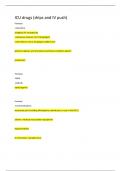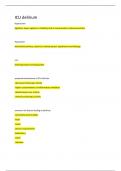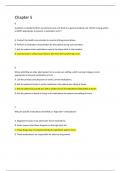Paulwanchez750
On this page, you find all documents, package deals, and flashcards offered by seller paulwanchez750.
- 145
- 0
- 0
Community
- Followers
- Following
145 items

ICU drugs (drips and IV push)
Fentanyl -indications analgesia for intubated pt -continuous infusion: 0/7-10mcg/kg/hr -intermittent: 0.35-1.5mcg/kg IV q30min-1hr general, regional, and procedural anesthesia /sedation adjunct postop pain Fentanyl -MOA -Half Life opioid agonist
- Exam (elaborations)
- • 21 pages •
Fentanyl -indications analgesia for intubated pt -continuous infusion: 0/7-10mcg/kg/hr -intermittent: 0.35-1.5mcg/kg IV q30min-1hr general, regional, and procedural anesthesia /sedation adjunct postop pain Fentanyl -MOA -Half Life opioid agonist

ICU delirium
Hyperactive Agitation, hyper-vigilance, irritability, lack of concentration, and perseveration Hypoactive diminished alertness, absent or slowed speech, hypokinesia and lethargy mix both hyperactive and hypoactive
- Exam (elaborations)
- • 7 pages •
Hyperactive Agitation, hyper-vigilance, irritability, lack of concentration, and perseveration Hypoactive diminished alertness, absent or slowed speech, hypokinesia and lethargy mix both hyperactive and hypoactive

Critical Care Environments
An environment that provides comprehensive care for a wide variety of disorders is under what level of critical care units? Level I An environment that provides comprehensive critical care for most disorders but the unit may not be able to care for specific types of patients is under what level of critical care units? Level II An environment that provides initial stabilization of critically ill patients but limited in ability to provide comprehensive critical care is under what level of c...
- Exam (elaborations)
- • 5 pages •
An environment that provides comprehensive care for a wide variety of disorders is under what level of critical care units? Level I An environment that provides comprehensive critical care for most disorders but the unit may not be able to care for specific types of patients is under what level of critical care units? Level II An environment that provides initial stabilization of critically ill patients but limited in ability to provide comprehensive critical care is under what level of c...

Critical care clinical competency
SA node rate 60-100 Atria rate 60-80 AV junction rate 40-60 Ventricles rate 20-40
- Exam (elaborations)
- • 15 pages •
SA node rate 60-100 Atria rate 60-80 AV junction rate 40-60 Ventricles rate 20-40

Critical Care/ICU Competency
VersaCare Bed - blue air mattress that provides pressure relief for pts with up to Stage III pressure sores --> air fills up on one side in order to turn the pt --> pressure relief primarily to UB (staff must reposition LB in order to provide full body relief) Total Sport Care Bed - each ICU unit owns 1-2 total sport care beds. Include pink air mattress that provides some pressure relief to the pt with rotation in UB --> provides pulmonary care to pts who require frequent chest p...
- Exam (elaborations)
- • 33 pages •
VersaCare Bed - blue air mattress that provides pressure relief for pts with up to Stage III pressure sores --> air fills up on one side in order to turn the pt --> pressure relief primarily to UB (staff must reposition LB in order to provide full body relief) Total Sport Care Bed - each ICU unit owns 1-2 total sport care beds. Include pink air mattress that provides some pressure relief to the pt with rotation in UB --> provides pulmonary care to pts who require frequent chest p...

Complex Practice Questions-Critical Care E.D.
An older adult patient in the ICU has diabetes. Which intervention could the nurse perform that would best prevent complications related to this disease? A) Have the patient rise from his bed and bear weight. B) Offer the patient sugar-free candy. C) Bathe the patients feet daily and apply emollient. D) Reposition the patient often in bed. C) Bathe the patients feet daily and apply emollient. An elderly patient in the ICU has hyperthyroidism. As the nurse is talking with her, she suddenly...
- Exam (elaborations)
- • 83 pages •
An older adult patient in the ICU has diabetes. Which intervention could the nurse perform that would best prevent complications related to this disease? A) Have the patient rise from his bed and bear weight. B) Offer the patient sugar-free candy. C) Bathe the patients feet daily and apply emollient. D) Reposition the patient often in bed. C) Bathe the patients feet daily and apply emollient. An elderly patient in the ICU has hyperthyroidism. As the nurse is talking with her, she suddenly...

Common ICU Drugs
Ancef cefazolin sodium 1st generation cephalosporin abx indications: endocarditis, septicemia, bacteria associated with intravascular line monitor: fever, s/s, cbc, hepatic/renal function, PTT, superinfections Dexmedetomidine hydrochloride Precedex alpha 2 adrenergic agonist, sedative indication: sedation, mechanically intubated, general anesthesia, sedation awake craniotomy, AGITATED, impulsive MOA: affects alpha 2 with slow infusions, and alpha 1 and 2 with rapid. monitor: HR, BP
- Exam (elaborations)
- • 26 pages •
Ancef cefazolin sodium 1st generation cephalosporin abx indications: endocarditis, septicemia, bacteria associated with intravascular line monitor: fever, s/s, cbc, hepatic/renal function, PTT, superinfections Dexmedetomidine hydrochloride Precedex alpha 2 adrenergic agonist, sedative indication: sedation, mechanically intubated, general anesthesia, sedation awake craniotomy, AGITATED, impulsive MOA: affects alpha 2 with slow infusions, and alpha 1 and 2 with rapid. monitor: HR, BP

Chapter 11
While completing preoperative patient teaching, which information should the nurse include for a surgery with a general anesthetic? a. It produces muscle relaxation and loss of consciousness. b. It affects a specific region of the body to block pain sensation. c. It uses only one type of medication to produce sedation. d. It provides moderate sedation that allows you to relax. a A patient verbalizes concern to the nurse regarding postoperative nausea and vomiting from the anesthesia. Whi...
- Exam (elaborations)
- • 3 pages •
While completing preoperative patient teaching, which information should the nurse include for a surgery with a general anesthetic? a. It produces muscle relaxation and loss of consciousness. b. It affects a specific region of the body to block pain sensation. c. It uses only one type of medication to produce sedation. d. It provides moderate sedation that allows you to relax. a A patient verbalizes concern to the nurse regarding postoperative nausea and vomiting from the anesthesia. Whi...

Chapter 5
A patient is transferred from an intensive care unit (ICU) to a general medical unit. Which nursing action is MOST appropriate to prevent a medication error? A. Contact the health care provider to rewrite all drug prescriptions. B. Perform a medication reconciliation for the patient during care transition. C. Ask the patient what medications need to be taken while in the hospital. D. Communicate a verbal report face to face from the transferring nurse. D When admitting an older adult pati...
- Exam (elaborations)
- • 5 pages •
A patient is transferred from an intensive care unit (ICU) to a general medical unit. Which nursing action is MOST appropriate to prevent a medication error? A. Contact the health care provider to rewrite all drug prescriptions. B. Perform a medication reconciliation for the patient during care transition. C. Ask the patient what medications need to be taken while in the hospital. D. Communicate a verbal report face to face from the transferring nurse. D When admitting an older adult pati...

CHAPTER 1: INTRODUCTION TO CRITICAL CARE
Critical care nurses ___________ provide specialized care to patients experiencing a life threatening or potentially lifethreatening illness. Must have an adequate understanding of the practice of critical care nursing that is embodied in different standards of care competencies as well as an affiliate and continuously adheres to professional organizations in critical care nursing. complex, intensive and continuous A _____________ type of care is significantly required through education and...
- Exam (elaborations)
- • 34 pages •
Critical care nurses ___________ provide specialized care to patients experiencing a life threatening or potentially lifethreatening illness. Must have an adequate understanding of the practice of critical care nursing that is embodied in different standards of care competencies as well as an affiliate and continuously adheres to professional organizations in critical care nursing. complex, intensive and continuous A _____________ type of care is significantly required through education and...
